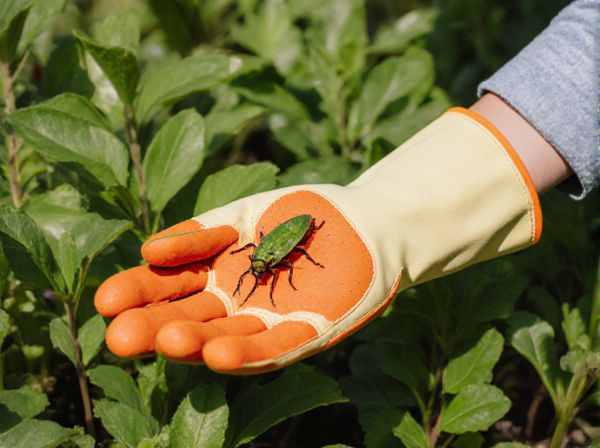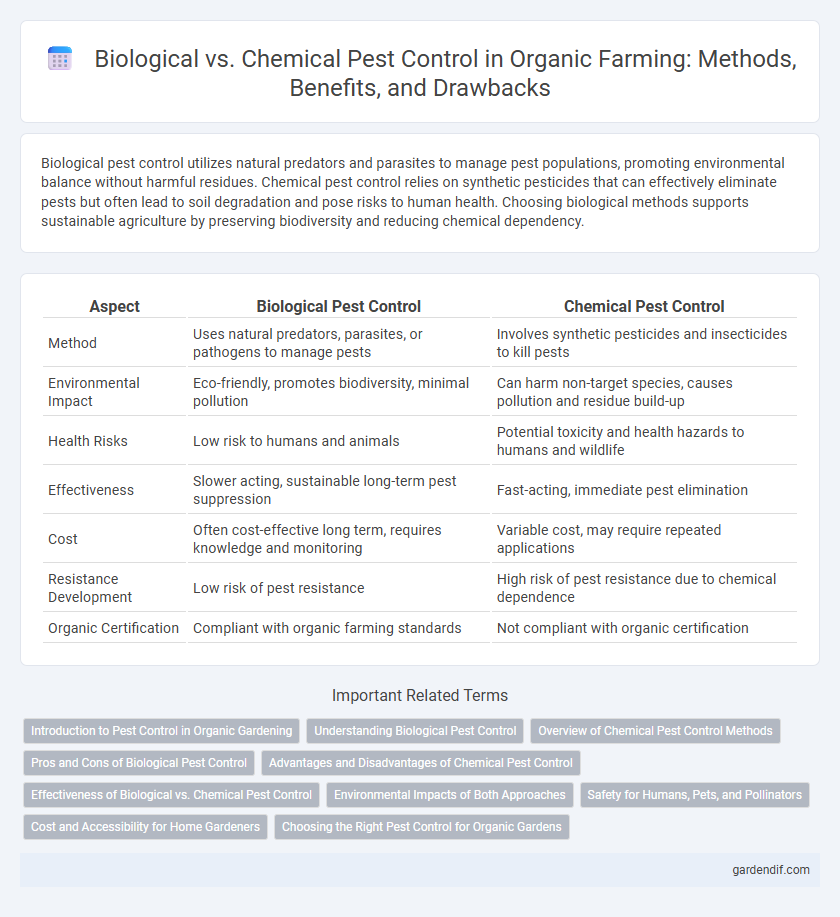
Biological pest control vs chemical pest control Illustration
Biological pest control utilizes natural predators and parasites to manage pest populations, promoting environmental balance without harmful residues. Chemical pest control relies on synthetic pesticides that can effectively eliminate pests but often lead to soil degradation and pose risks to human health. Choosing biological methods supports sustainable agriculture by preserving biodiversity and reducing chemical dependency.
Table of Comparison
| Aspect | Biological Pest Control | Chemical Pest Control |
|---|---|---|
| Method | Uses natural predators, parasites, or pathogens to manage pests | Involves synthetic pesticides and insecticides to kill pests |
| Environmental Impact | Eco-friendly, promotes biodiversity, minimal pollution | Can harm non-target species, causes pollution and residue build-up |
| Health Risks | Low risk to humans and animals | Potential toxicity and health hazards to humans and wildlife |
| Effectiveness | Slower acting, sustainable long-term pest suppression | Fast-acting, immediate pest elimination |
| Cost | Often cost-effective long term, requires knowledge and monitoring | Variable cost, may require repeated applications |
| Resistance Development | Low risk of pest resistance | High risk of pest resistance due to chemical dependence |
| Organic Certification | Compliant with organic farming standards | Not compliant with organic certification |
Introduction to Pest Control in Organic Gardening
Biological pest control in organic gardening utilizes natural predators and beneficial insects to manage pest populations, enhancing ecosystem balance without harmful chemicals. Chemical pest control relies on synthetic pesticides that can disrupt soil health, contaminate water sources, and harm beneficial organisms. Organic gardening emphasizes biological methods to maintain plant health while preserving environmental quality and promoting sustainable agriculture.
Understanding Biological Pest Control
Biological pest control employs natural predators, parasites, or pathogens to manage pest populations, minimizing environmental impact and promoting sustainable agriculture. Unlike chemical pest control, which relies on synthetic pesticides that can harm beneficial insects and lead to resistance, biological methods enhance ecosystem balance and biodiversity. Key agents include ladybugs, parasitic wasps, and microbial insecticides, effectively reducing pests while preserving soil health and crop productivity.
Overview of Chemical Pest Control Methods
Chemical pest control methods primarily involve the use of synthetic pesticides such as insecticides, herbicides, and fungicides to target pests rapidly and effectively. These substances work by interfering with the nervous system, reproductive cycle, or feeding mechanisms of insects, weeds, and fungi, often providing immediate pest reduction. However, chemical controls can lead to resistance development, environmental pollution, and non-target species harm, contrasting with the sustainable approach of biological pest control.
Pros and Cons of Biological Pest Control
Biological pest control utilizes natural predators, parasites, or pathogens to manage pest populations, reducing the reliance on synthetic chemicals and minimizing environmental pollution. It promotes long-term pest suppression and enhances biodiversity but often requires more time for effectiveness and can be less predictable compared to chemical control methods. Challenges include specific pest targeting, potential disruption of local ecosystems, and the need for careful monitoring to avoid unintended consequences.
Advantages and Disadvantages of Chemical Pest Control
Chemical pest control offers rapid and effective elimination of a wide range of pests, ensuring immediate protection for crops and plants. However, its disadvantages include potential harm to beneficial insects, development of pest resistance, and environmental contamination through chemical residues. Long-term reliance on chemical pesticides can disrupt ecosystems and pose health risks to humans and wildlife.
Effectiveness of Biological vs. Chemical Pest Control
Biological pest control harnesses natural predators and parasites to target specific pests, reducing environmental impact and promoting sustainable agricultural practices. Chemical pest control provides rapid and broad-spectrum pest elimination but may lead to resistance, non-target species harm, and soil contamination. Studies show that integrating biological methods with selective chemical use enhances long-term pest management effectiveness while minimizing ecological disruption.
Environmental Impacts of Both Approaches
Biological pest control utilizes natural predators and parasites, significantly reducing chemical residues and preserving biodiversity in ecosystems. Chemical pest control often leads to soil and water contamination, harming non-target species and fostering pesticide resistance. Adopting biological methods enhances sustainable agriculture by minimizing environmental degradation and promoting ecological balance.
Safety for Humans, Pets, and Pollinators
Biological pest control utilizes natural predators or parasites to manage pest populations, offering a safer approach for humans, pets, and pollinators compared to chemical pesticides, which often contain toxic substances harmful to non-target species. Chemical pest control can lead to contamination of soil and water, posing risks like poisoning or long-term health effects for families and beneficial insects such as bees and butterflies. Emphasizing biological methods reduces reliance on hazardous chemicals, promoting a healthier ecosystem and safeguarding essential pollinator populations vital for crop production.
Cost and Accessibility for Home Gardeners
Biological pest control offers home gardeners a cost-effective and sustainable alternative to chemical pesticides, often utilizing natural predators or beneficial organisms readily available in local nurseries or online. Chemical pest control typically involves higher upfront expenses and recurring purchases, along with potential accessibility restrictions due to regulations or safety concerns. Home gardeners benefit from biological methods not only through lower costs but also by fostering an eco-friendly environment that supports long-term plant health and biodiversity.
Choosing the Right Pest Control for Organic Gardens
Biological pest control uses natural predators and parasites to manage garden pests, providing an eco-friendly solution that preserves soil health and biodiversity. Chemical pest control relies on synthetic pesticides that can harm beneficial insects and contaminate the environment, making it less suitable for organic gardens. Selecting the right pest management strategy involves prioritizing organic-approved biological agents to maintain garden sustainability and comply with organic certification standards.
Biological pest control vs chemical pest control Infographic

 gardendif.com
gardendif.com